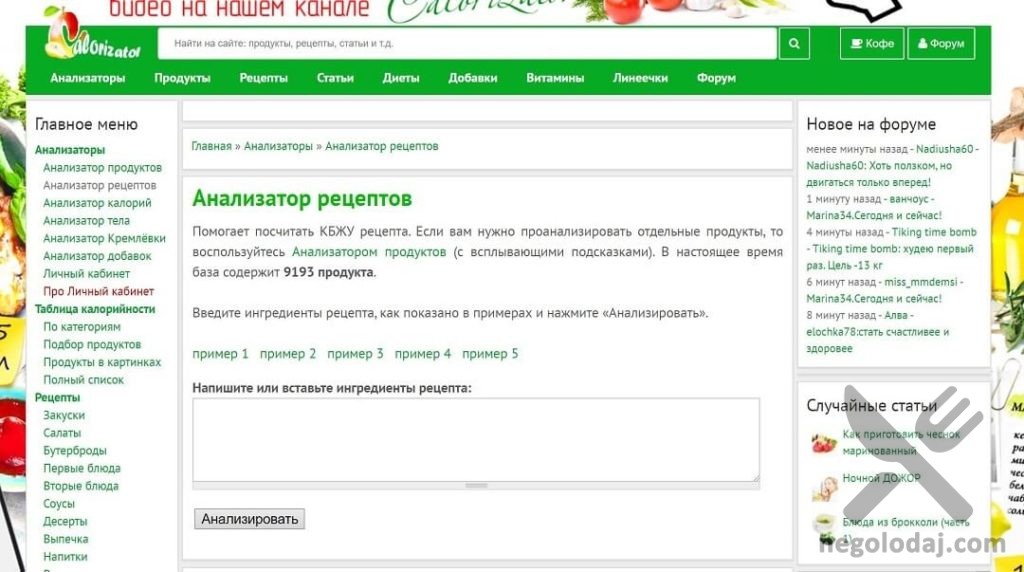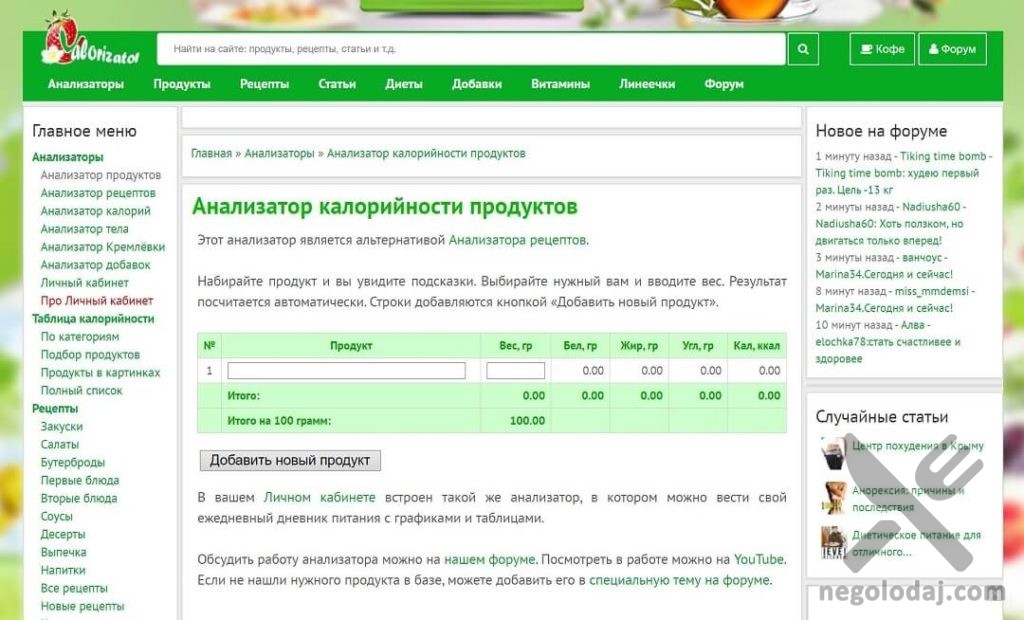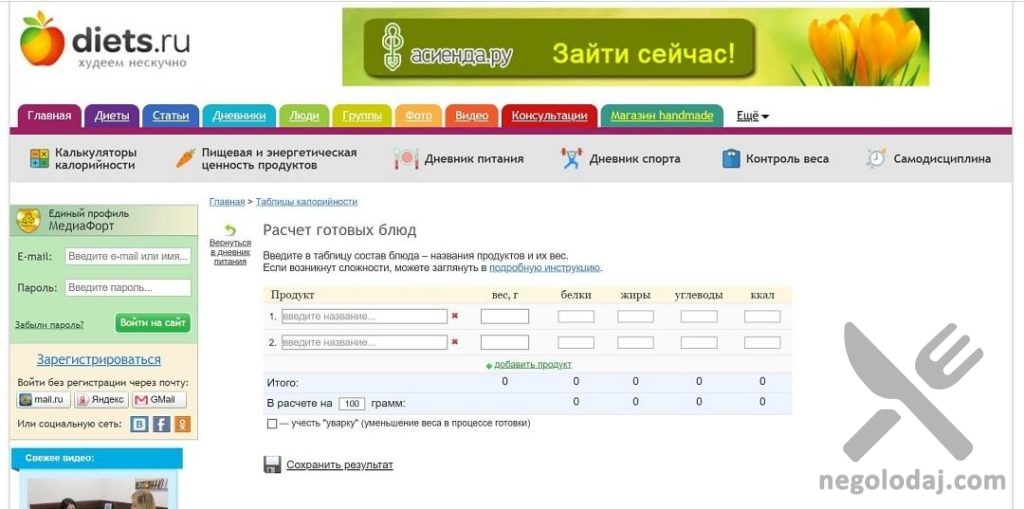How to Calculate Calories in a Recipe – Formula, Calculator, Table
It does not matter for what reasons you have thought about how to calculate the meal, the main thing is that today I will teach you to do it in seconds. In this case, a simple table and a formula will help us. And for more advanced users I will show you some online services and calculators that will simplify the process of calculating calories, proteins, fats and carbohydrates for complex dishes.
To make it clearer, I will do all the calculations on the example of the recipe “Cottage Cheese Buns“.

How to calculate the nutrition of a complex dish
The first thing we need to know is the weight, the energy value and the nutrition of each component before cooking. Not all services support measurements in pcs, spoons, glasses, etc., so sometimes all ingredients need to be measured in grams. In my case, the recipe indicated eggs in “pieces”, and salt and baking powder in “teaspoons”. So in the table they were all given in grams.
In the future you can write yourself basic translations of measurements to make it easier to fill in the table. For example, the average weight of a chicken egg (55 grams) or 1 teaspoon of salt without a slide (10 grams).
Tip
As a result, we get a table of Calories and Nutrition of this kind, where we have a detailed description of each ingredient, also we make the final row, in which we sum up individually all the columns: Weight, Protein, Fats, Carbohydrates and Calories.
| Ingredient | Measurement | Wight, g | Protein, g | Fats, g | Carbohydrates, g | Calories, kcal |
| Cottage cheese, 0% | 200 g | 200 | 33 | 0 | 2,6 | 142 |
| Chicken egg | 2 pcs | 110 | 13,97 | 11,99 | 0,77 | 172,7 |
| Salt | 0,5 tsp. | 5,5 | 0 | 0 | 0 | 0 |
| Rice flour | 50 g | 50 | 3,7 | 0,3 | 41 | 185,5 |
| Oatmeal flour | 50 g | 50 | 6,5 | 3,4 | 32,45 | 184,5 |
| Baking powder | 0,5 tsp. | 3,5 | 0 | 0 | 0,69 | 2,77 |
| TOTAL | 419 | 57,17 | 15,69 | 77,51 | 687,47 |
Now, using the rule of proportion, we can calculate the Nutrition for 1 or 100 grams of the finished dish.
Total caloric value of the dish / Total weight of the dish = Caloric value per 100 g serving / 100 g
We make a universal formula for calculating the caloric value of a complex dish in 100 grams.
Calorie in 100 g = Total calorie * 100 / Total weight of the dish
In my case, for cottage cheese buns, the final result will look like this:
Calorie 100 g buns = 687.47 * 100 / 419 = 164.07 kcal
Using a similar formula, you can calculate the content of any of the macronutrients (proteins, fats, carbohydrates) in the finished dish individually.
Protein amount per 100 g buns = 57.17 * 100 / 419 = 13.64 g
Fat amount per 100 g of buns = 15.69 * 100 / 419 = 3.74 g
Carbohydrates amount per 100 g buns = 77.51 * 100 / 419 = 18.5 g
Such precise calculations are most often needed for successful muscle gain, when drying or losing weight.
How to calculate Calories and Nutrition of the ready meal
So far we have learned how to calculate calories and nutrition for a dish that has not been heat-treated. But what to do when we are going to fry, cook or bake our ingredients. Everything is elementary – we weigh the finished dish, and calculate the caloric value and nutrition, according to the formulae derived earlier.
During heat treatment, depending on the type of heat treatment, the products may change their calories and nutrition slightly, but when calculating these changes we attribute them to error.
Fact
In finished form cottage cheese buns weigh 340 g, which means the following data will be relevant for them:
Calories per 100 g ready-made buns = 687.47 * 100 / 340 = 202.2 kcal
Protein amount per 100 g buns = 57.17 * 100 / 340 = 16.81 g
Fat amount per 100 g buns = 15.69 * 100 / 340 = 4.6 g
Carbohydrates amount per 100 g buns = 77.51 * 100 / 340 = 22.8 g
How to calculate Calories and Nutrition for one serving of a ready meal
The only thing we need to figure out is how to find out the data for the portion, for example, for one bun. It is much easier to understand how many calories, proteins, fats and carbohydrates we consumed by eating 1 piece. Here, too, everything is simple – we take the total weight of the finished dish and divide it by the number of portions.
Weight per serving = Weight of the cooked dish / Number of servings
In my case, I got 7 buns, so we get the following calculations:
Weight per bun = 340 g / 7 = 48.57 g
Now we can safely recalculate all data for one portion:
Calories for 1 serving = Total Calorie * Portion weight / Total weight of the dish
For cottage cheese buns, the calculations will be as follows:
Calories for 1 bun = 687.47 * 48.57 / 340 = 98.21 kcal
Protein amount per 1 bun = 57.17 * 48.57 / 340 = 8.17 g
Fat amount per 1 bun = 15.69 * 48.57 / 340 = 2.24 g
Carbohydrates amount per 1 bun = 77.51 * 48.57 / 340 = 11.07 g
Food Calorie Calculator online
Now you know how to calculate nutrition for the product and the finished dish, regardless of the number of ingredients and type of cooking, whether it’s a salad, soup or dessert. And as a bonus, as promised, I will tell you about the online calculators that perform all calculations for you, according to the recipe you specify.
The first in the list will be the Calorizator website. This is one of the top resources on slimming and nutrition. Its monthly audience is about 3 million people. In this case we are interested in one of its free services “Calorizator of calories recipes online“.

Enter the whole recipe into the text field and click the “Analyze” button. The system automatically detects the products and reduces the various measuring measures in grams. All we have to do is reread the list of products and correct the inaccuracies.
We can also perform a similar procedure in the service “Calorie Calculator of products“. It differs from the previous version only by the fact that all the ingredients you enter manually, 1 piece each. Sometimes it is more convenient, because you immediately see the list of ingredients in the drop-down list, when you enter the name. As a result, we get an accurate table of calories and nutrition, identical to the one made by our hands.

The second resource, which also allows you to find out for free the caloric value and LPG of finished products, while taking into account the “heat treatment” – Diets.ru. We are interested in a calculator called “Calculation of ready meals“.

Similar to the previous service, we enter all necessary ingredients and their weight one by one. As a result, we get a complete picture of the ready meal according to calories and nutrition, and an additional line with the expectation of 100 grams.
FAQ
What does nutrition mean?
Why is it important to follow the nutrition?
How many calories and nutrition per day?
What should the nutrition be like to lose weight?
Why calculate the nutrition?



 (Ratings:8, average: 4.88)
(Ratings:8, average: 4.88) 
